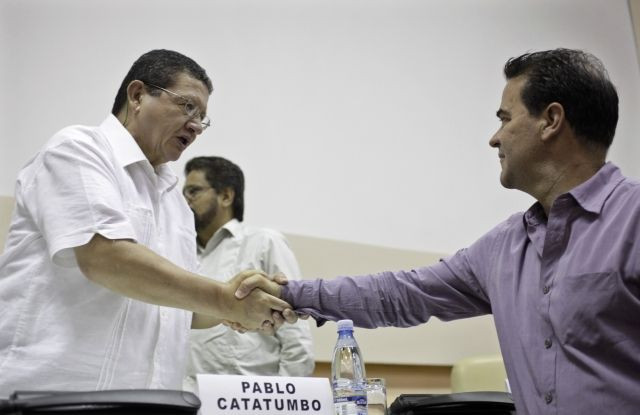
The Colombian government reached an agreement on land reform with the FARC -- the country's biggest rebel group, which has been engaged in armed conflict with the government since 1964 -- during ongoing peace talks in Havana. The deal is being touted by both sides as a major breakthrough on a pivotal issue, and have excited hopes that the Havana talks could bring an end to the conflict. It is the fourth attempt since the 1980s.
"It is the first agreement reached in 40 years of conflict on the crucial issue of land," Camilo Gonzalez, president of Colombia's independent Institute of Peace and Development Studies, told the Associated Press. "This confirms that this process is different from those of the past."
RELATED:
Marco Rubio Unsettles Immigration Reform Bill Supporters; What Does He Want?
Yoani Sanchez Returns To Cuba; What's Next For The Dissident Blogger?
Nicolas Maduro Denounces Colombian President Juan Manuel Santos As Backstabber
The FARC has asked for 9 million hectares of land to be granted for what they call "peasant reserves" and that the government rejects as "independent republics." About 2 million hectares of land has been stolen from rural farmers by armed groups since the start of the conflict, and another 4 million hectares has been abandoned by peasants displaced by it. The government has spoken publicly of returning lands to peasants and giving them titles to it, but does not want to grant autonomy along with it. The exact nature of the deal struck remains unclear.
Meanwhile, an office of the U.S. Army in Colombia's capital, Bogotá, has requested proposals for a 20-episode campaign of radio novellas with an anti-guerrilla message. The novellas will promote demobilization, democratic alternatives to violence, "traditional family values" and "belief in the respectful treatment of women"; discourage recruitment by the FARC, and address emerging environmental concerns, according to the official request. Each 15-minute episode will be based on ideas given by a MISO team (Military Informational Support Operations), which will include statements from actual demobilized guerrilla fighters, according to the Associated Press.
The soaps will be broadcast through radio, which the MISO team has determined constitute the most effective way of reaching areas far off the beaten path, and they will be performed in dialects of Spanish common to natives of the regions most affected by the conflict. Whoever wins the contract to produce the series will have 60 days to do it.
According to the Associated Press, the army's office in Colombia indicated that radio novellas have been part of anti-guerrilla campaigns in the past, with at least two novellas of 400 episodes known collectively as "Héroes de Guerra" ("War Heroes") being broadcast five years ago.
© 2025 Latin Times. All rights reserved. Do not reproduce without permission.




